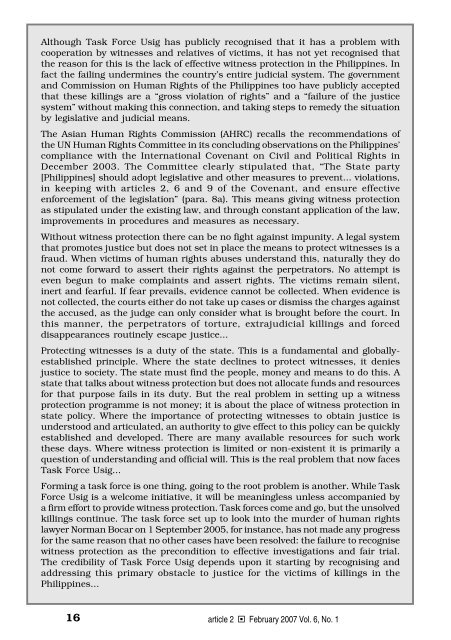of the Philippines the criminal justice system is - Article 2
of the Philippines the criminal justice system is - Article 2
of the Philippines the criminal justice system is - Article 2
Create successful ePaper yourself
Turn your PDF publications into a flip-book with our unique Google optimized e-Paper software.
Although Task Force Usig has publicly recogn<strong>is</strong>ed that it has a problem with<br />
cooperation by witnesses and relatives <strong>of</strong> victims, it has not yet recogn<strong>is</strong>ed that<br />
<strong>the</strong> reason for th<strong>is</strong> <strong>is</strong> <strong>the</strong> lack <strong>of</strong> effective witness protection in <strong>the</strong> <strong>Philippines</strong>. In<br />
fact <strong>the</strong> failing undermines <strong>the</strong> country’s entire judicial <strong>system</strong>. The government<br />
and Comm<strong>is</strong>sion on Human Rights <strong>of</strong> <strong>the</strong> <strong>Philippines</strong> too have publicly accepted<br />
that <strong>the</strong>se killings are a “gross violation <strong>of</strong> rights” and a “failure <strong>of</strong> <strong>the</strong> <strong>justice</strong><br />
<strong>system</strong>” without making th<strong>is</strong> connection, and taking steps to remedy <strong>the</strong> situation<br />
by leg<strong>is</strong>lative and judicial means.<br />
The Asian Human Rights Comm<strong>is</strong>sion (AHRC) recalls <strong>the</strong> recommendations <strong>of</strong><br />
<strong>the</strong> UN Human Rights Committee in its concluding observations on <strong>the</strong> <strong>Philippines</strong>’<br />
compliance with <strong>the</strong> International Covenant on Civil and Political Rights in<br />
December 2003. The Committee clearly stipulated that, “The State party<br />
[<strong>Philippines</strong>] should adopt leg<strong>is</strong>lative and o<strong>the</strong>r measures to prevent... violations,<br />
in keeping with articles 2, 6 and 9 <strong>of</strong> <strong>the</strong> Covenant, and ensure effective<br />
enforcement <strong>of</strong> <strong>the</strong> leg<strong>is</strong>lation” (para. 8a). Th<strong>is</strong> means giving witness protection<br />
as stipulated under <strong>the</strong> ex<strong>is</strong>ting law, and through constant application <strong>of</strong> <strong>the</strong> law,<br />
improvements in procedures and measures as necessary.<br />
Without witness protection <strong>the</strong>re can be no fight against impunity. A legal <strong>system</strong><br />
that promotes <strong>justice</strong> but does not set in place <strong>the</strong> means to protect witnesses <strong>is</strong> a<br />
fraud. When victims <strong>of</strong> human rights abuses understand th<strong>is</strong>, naturally <strong>the</strong>y do<br />
not come forward to assert <strong>the</strong>ir rights against <strong>the</strong> perpetrators. No attempt <strong>is</strong><br />
even begun to make complaints and assert rights. The victims remain silent,<br />
inert and fearful. If fear prevails, evidence cannot be collected. When evidence <strong>is</strong><br />
not collected, <strong>the</strong> courts ei<strong>the</strong>r do not take up cases or d<strong>is</strong>m<strong>is</strong>s <strong>the</strong> charges against<br />
<strong>the</strong> accused, as <strong>the</strong> judge can only consider what <strong>is</strong> brought before <strong>the</strong> court. In<br />
th<strong>is</strong> manner, <strong>the</strong> perpetrators <strong>of</strong> torture, extrajudicial killings and forced<br />
d<strong>is</strong>appearances routinely escape <strong>justice</strong>...<br />
Protecting witnesses <strong>is</strong> a duty <strong>of</strong> <strong>the</strong> state. Th<strong>is</strong> <strong>is</strong> a fundamental and globallyestabl<strong>is</strong>hed<br />
principle. Where <strong>the</strong> state declines to protect witnesses, it denies<br />
<strong>justice</strong> to society. The state must find <strong>the</strong> people, money and means to do th<strong>is</strong>. A<br />
state that talks about witness protection but does not allocate funds and resources<br />
for that purpose fails in its duty. But <strong>the</strong> real problem in setting up a witness<br />
protection programme <strong>is</strong> not money; it <strong>is</strong> about <strong>the</strong> place <strong>of</strong> witness protection in<br />
state policy. Where <strong>the</strong> importance <strong>of</strong> protecting witnesses to obtain <strong>justice</strong> <strong>is</strong><br />
understood and articulated, an authority to give effect to th<strong>is</strong> policy can be quickly<br />
establ<strong>is</strong>hed and developed. There are many available resources for such work<br />
<strong>the</strong>se days. Where witness protection <strong>is</strong> limited or non-ex<strong>is</strong>tent it <strong>is</strong> primarily a<br />
question <strong>of</strong> understanding and <strong>of</strong>ficial will. Th<strong>is</strong> <strong>is</strong> <strong>the</strong> real problem that now faces<br />
Task Force Usig...<br />
Forming a task force <strong>is</strong> one thing, going to <strong>the</strong> root problem <strong>is</strong> ano<strong>the</strong>r. While Task<br />
Force Usig <strong>is</strong> a welcome initiative, it will be meaningless unless accompanied by<br />
a firm effort to provide witness protection. Task forces come and go, but <strong>the</strong> unsolved<br />
killings continue. The task force set up to look into <strong>the</strong> murder <strong>of</strong> human rights<br />
lawyer Norman Bocar on 1 September 2005, for instance, has not made any progress<br />
for <strong>the</strong> same reason that no o<strong>the</strong>r cases have been resolved: <strong>the</strong> failure to recogn<strong>is</strong>e<br />
witness protection as <strong>the</strong> precondition to effective investigations and fair trial.<br />
The credibility <strong>of</strong> Task Force Usig depends upon it starting by recogn<strong>is</strong>ing and<br />
addressing th<strong>is</strong> primary obstacle to <strong>justice</strong> for <strong>the</strong> victims <strong>of</strong> killings in <strong>the</strong><br />
<strong>Philippines</strong>...<br />
16<br />
article 2 • February 2007 Vol. 6, No. 1

















